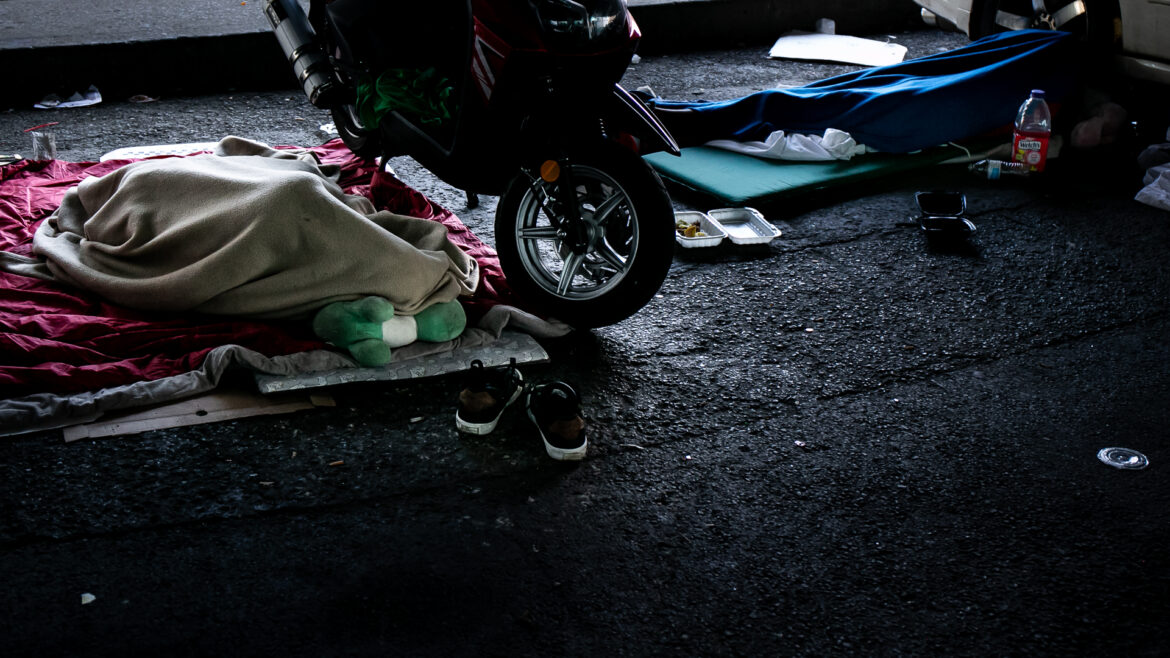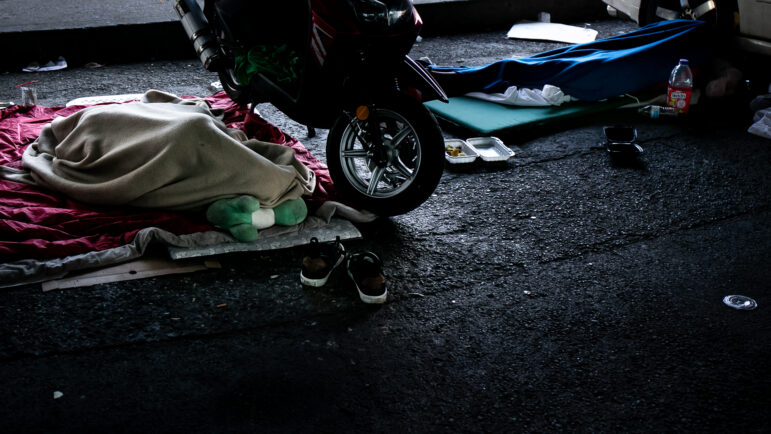
“This will push an already vulnerable population deeper into hopelessness and despair, rather than offering the ‘tough love’ that might inspire them to pull themselves up by their nonexistent bootstraps.”

Adi Talwar
People sleeping in the street under the Brooklyn Queens Expressway in Clinton Hill.
Late last month, the U.S. The Supreme Court decided in Grants Pass v. Johnson that people without homes can be penalized for sleeping in public spaces by being fined, arrested, and/or imprisoned, whether or not they have any viable alternatives. Before a few months ago, I had never heard of Grants Pass, Oregon. So when I learned that the Supreme Court was taking up a case that started with a small group of unhoused residents there, I was intrigued.
The truth is that right now, legislators across the country are already passing laws that criminalize homelessness rather than addressing the results of systemic injustices that force people into economic crises. Some of these laws include prohibitions around lying down, camping, sleeping, or even eating in public spaces. Others go as far as prohibiting the act of offering free food to an unhoused person.
Just a few years ago, City Relief—the nonprofit I lead as CEO, which provides food, supplies, resource connections, and care coordination for those experiencing homelessness—was nearly forced to shut down our weekly pop-up outreach event just outside Newark Penn Station. This was due to a group of wealthy investors and political interests who decided that the local homeless community was detrimental to their business.
Apparently, the presence of well-meaning individuals offering a modicum of dignity to homeless people was to blame for the continued presence of these individuals at one of the only climate-controlled public spaces with accessible bathrooms in the area. Fortunately, the pushback that flared up soon after temporarily stopped this ordinance in its tracks.
I am not naive to the genuine struggles that well-intentioned residents face when a tent community, or even just one homeless individual, sets up in their neighborhood. This crisis is a significant challenge, and every situation is unique, making any one-size-fits-all solution at best inadequate, and at worst, cruel.
Meanwhile, the number of people falling into homelessness nationwide continues to grow exponentially. An annual count of people without adequate shelter in January 2023 found that the total number of homeless individuals nationwide has increased by 12 percent since the year prior. This increase coincides with a dramatic rise in the average cost of living over the past two years and a sharp decline in vacancy rates in cities like New York, which, at 1.4 percent, is the lowest level since 1968.
This brings me back to the majority decision written by Justice Neil Gorsuch, which states, “The court cannot say that the punishments Grants Pass imposes here qualify as cruel and unusual. The city imposes only limited fines for first-time offenders, an order temporarily barring an individual from camping in a public park for repeat offenders, and a maximum sentence of 30 days in jail for those who later violate an order.”
I understand how on the surface, this seems reasonable. If I had any trust in the compassionate intentions of most government officials, business leaders, and law enforcement professionals regarding our homeless neighbors, I wouldn’t be so worried.
To a Supreme Court justice, 30 days in jail may not seem cruel or unusual. But to a young person who has just aged out of foster care with no job prospects, no family, and no friends to stay with, the words “only limited fines” and a “maximum sentence of 30 days in jail” feel like the end of the world. And, as Justice Sonia Sotomayor pointed out in her dissenting opinion, “Incarceration and warrants from unpaid fines can also result in the loss of employment, benefits, and housing options.”
My nearly 15 years of experience working with the unhoused residents of New York City and New Jersey have shown me that this decision is going to provide legal cover for dehumanizing and discriminatory behavior. This will push an already vulnerable population deeper into hopelessness and despair, rather than offering the “tough love” that might inspire them to pull themselves up by their nonexistent bootstraps.
Making it illegal to sleep on the street won’t stop unhoused people from existing, nor will it break the cycles of injustice, suffering, trauma, and poverty that led them to this point in the first place.
This ruling simply empowers cities and states, which are already neglecting their most vulnerable residents, to prioritize criminalizing poverty over fulfilling their responsibility to provide assistance. Mahatma Gandhi is attributed to the quote, “A nation’s greatness is measured by how it treats its weakest members.” If he is right, we are all worse off today than we were before the decision.
Josiah Haken is the CEO at City Relief.






